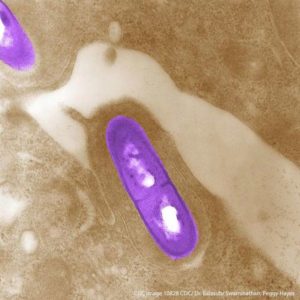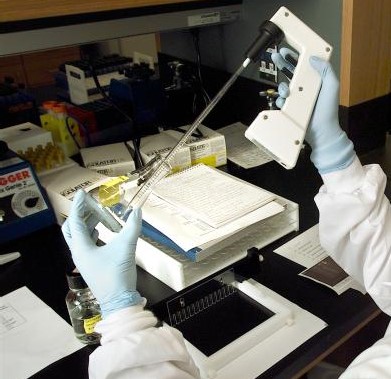You can sue for listeriosis food poisoning if there is evidence that a food product contaminated with Listeria bacteria made you sick. If you want to talk with a Listeria lawyer about your case, contact our law firm at 1-888-377-8900 or use the form below for a 100% free consultation. Our award winning Listeria legal team would be happy to discuss your case with you.
Listeria Outbreak News and Investigations From Our Food Safety Legal Team
“We put our trust in Pritzker Hageman at the beginning and that trust only grew.”
– A recent Pritzker Hageman food safety client we represented in a lawsuit against a major food company
Listeriosis is the disease caused by ingesting food contaminated with Listeria monocytogenes, a foodborne bacteria that is particularly dangerous for pregnant women, babies, the elderly and people with compromised immune systems (diabetes, cancer, HIV, etc.). Foods commonly associated with this disease are unpasteurized milk, soft cheeses, ice cream, smoked fish and raw and ready-to-eat meat and poultry products.
To make a diagnosis, cells of this organism are isolated from blood, cerebrospinal fluid, or an otherwise normally sterile site (e.g. placenta and fetus). The elderly, immuno-compromised persons and pregnant women are particularly vulnerable to this illness. Initial symptoms include nausea, vomiting, cramps, diarrhea, headache, constipation and persistent fever.
This infection frequently triggers sespticemia, pneumonia, and meningitis. In pregnant women, it usually causes a mild, flu-like illness followed by miscarriage, stillbirth, or bacteremia and meningitis in newborns.
Although this illness is relatively rare, it is one of the most deadly foodborne diseases, accounting for roughly 28% of all deaths resulting from foodborne illness.
The time period between consuming food contaminated with L. monocytogenes and the onset of illness can be as long as 70 days. This makes it extremely difficult to pinpoint the source of an outbreak.
Can I Sue for Listeriosis?
Yes, you can sue for listeriosis food poisoning if there is sufficient evidence to connect the illness to a food product. These cases involve a product contaminated during processing and sold at a grocery store or other retailer (Costco or Walmart, for example). Settlements our law firm has won include:
- $6.45 million in a case involving a contaminated deli product
- $4.5 million for a young man who suffered permanent brain damage
Not every case is this large, but it is important to hire a lawyer who has won these kinds of settlements. Contact attorney Eric Hageman and the lawyers on his food safety team.
What if My Elderly Parent Gets Sick?
Many of our clients have been elderly people who almost died from this severe illness. Most of these clients developed meningitis, an infection of the lining of the brain. This can lead to permanent brain damage. Eric and our team of Listeria lawyers have won multimillion-dollar settlements for these clients and helped them get justice.
If your parent dies, you may have a wrongful death claim, meaning you may have the right to file a lawsuit. Both minor and adult children generally have this right. We have handled cases where the person who died was not elderly.

What if My Baby Gets Sick because I Ate Food Contaminated with Listeria When I Was Pregnant?
You can sue if your baby is born with listeriosis because you ate food contaminated with L. monocytogenes when you were pregnant. As in all of these cases, there has to be sufficient evidence connecting the illnesses to a food product. Because your little one may have lifelong health problems, it is important that you take steps to get full compensation.
Can I Sue if My Baby Died from Listeriosis?
Yes, if there is sufficient evidence, you can sue if your baby died from listeriosis. In some cases, the baby seems fine when he or she is born, but a few hours or days later, the little one gets very sick and does not survive.
If you had a miscarriage and we can prove you had listeriosis at the time, you may have a case. Attorney Eric Hageman and his team represented a woman who had a miscarriage after being diagnosed. He obtained a multimillion-dollar settlement for the grieving mother and father.
What Evidence Do Your Attorneys Use to Prove a Case?

Our lawyers use the results of genetic (DNA) testing done on bacterial isolates and epidemiological evidence.
There are two primary DNA testing procedures used in outbreaks to determine what food product was contaminated and caused the outbreak.
- Pulsed-field gel electrophoresis (PFGE) is an older DNA “fingerprinting” method that scientists have used to determine the source of bacterial outbreaks. A DNA molecule from an isolate of L. monocytogenes bacteria found in a patient or a food product is digested into pieces with special enzymes that break the DNA molecule into individual pieces, which are pulsed across a gel until the pieces are separated as distinct bands in the gel, based on size. The resulting pattern of 30 to 50 bands, which resembles a bar code, is the DNA “fingerprint.” This fingerprint is referred to as the PFGE pattern. PFGE is rarely used in investigations any more, as the superior WGS technology has become more widely available.
- Whole Genome Sequencing (WGS) provides a complete DNA make-up of a specific L. monocytogenes isolate from a patient or food product. WGS provides more information than PFGE, including evidence of the specific geographic location where the bug originated. WGS is now used by the CDC, FDA, USDA and other national and state labs in almost all foodborne illness outbreaks
Before you hire a lawyer, you should ask them if they understand PFGE and WGS testing and if they have ever successfully used it as evidence.
Our lawyers also use epidemiological evidence. This includes interviews with patients, their families and others regarding food eaten in the month before illness, “traceback” investigations looking for the original source of an outbreak, farm and processing facility inspections, company communications (emails) and testing results, and similar evidence.
How Long Do I Have to File a Lawsuit?
This will depend on “statute of limitations” laws, which generally allow 2 or 3 years to file a lawsuit, but you absolutely need to contact a lawyer about this because you can lose your legal right to sue for compensation if you do not act in time. This time generally starts to “run” when there is evidence regarding who was legally responsible. For example, in a recent outbreak, people were diagnosed over a period of years with listeriosis caused by L. monocytogenes with matching PFGE patterns. It took over 4 years for the food source of this outbreak to be determined. In this case, the statute of limitations did not start to run until that determination was made. This meant that someone sickened 4 years before the food source was found still had the full 2 or 3 year statute of limitations to file a lawsuit. Attorney Eric Hageman and his team have successfully handled cases like this.
The state where a lawsuit is filed is extremely important. The statute of limitations can be different and, in some states, there is a limit to the amount of money one can get for “pain and suffering,” which can be in the millions in some cases. For example, an outbreak is caused by Company A with corporate offices in State 1, and the implicated food was sold at a grocery store in State 2. State 1 has a limit of $250,000 for pain and suffering compensation. State 2 does not have a limit. Your lawyer will need to look at this and other factors to determine in which state to file the suit.
Can I Sue a Restaurant?
Yes, if the listeriosis infection can be connected to the restaurant, you may have the right to sue the restaurant, the company that sold it the implicated food product, a food processor and others. Our lawyers have won many, many lawsuits against restaurants for food poisoning.
Can I Sue a Grocery Store?
If a food product you purchased at a grocery store made you sick, you may also have a claim against the grocery store , distributor, food processor, grower and others.
What if There Was a Recall of Food Contaminated with Listeria?
If your illness is linked to a food product, you probably have a case even if there is not a recall. The recall and related documents may help your case, but the primary reason for recalls is to prevent further illness. In one of Pritzker Hageman’s cases, we contacted the federal government about the harm done, and a recall of the product was issued within days.
A recall can be issued by a food processor (Dole and Blue Bell Ice Cream, for example) and/or by a retailer (Costco, Walmart, Whole Foods, Trader Joes, Krogers, for example).
Should I Be Part of a Class Action Lawsuit?
Probably not. A class action lawsuit is generally not applicable for people sickened in an outbreak. This is because those sickened have varying degrees of illness and will be entitled to varying degrees of money based on age, level of disability, wage loss, medical expenses, etc. These differences, plus many others, account for the difficulty in getting these cases certified as a class action. You need to consult a lawyer with experience winning these kinds of cases to make your decision. We strongly recommend that you get another opinion if a lawyer tells you that you or your sick loved one should be part of a class action lawsuit.
Our Law Firm Can Help You

If your loved one has listeriosis, you need information. We are lawyers who have helped many families like yours whose loved ones ate contaminated food and ended up fighting for their lives. The physical pain associated with this illness is horrendous, and the bug that causes this illness, Listeria monocytogenes, is particularly dangerous because it quickly and easily moves from the intestines to the lungs, pancreas, brain, heart and placenta.
You are probably not thinking about suing the company responsible for the illness right now. You just want your loved one to get better. You can click here now if you want a FREE consultation with our Listeria lawyers. They know a lot about this illness and would be happy to talk with you.

